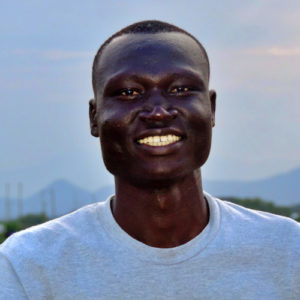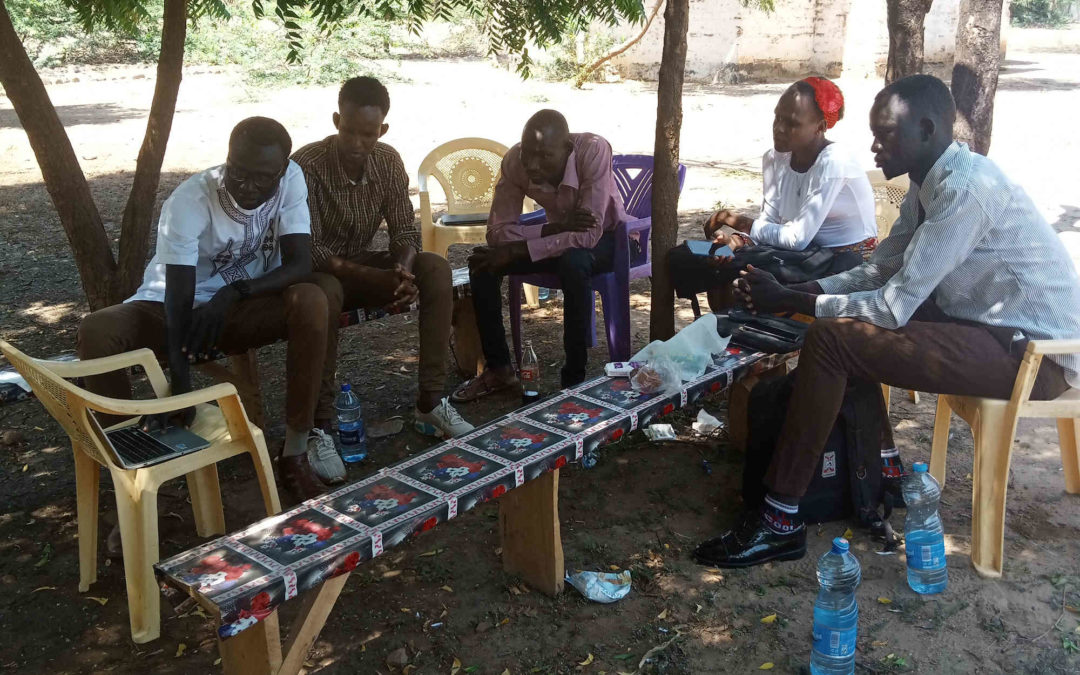We recently expanded our Una Hakika misinformation management project to Kakuma Refugee Camp and nearby areas of northwestern Kenya. Our goal is to support refugees and host communities in stopping the spread of harmful rumours and misinformation that contribute to conflict and hinder humanitarian aid delivery, including public health responses to the COVID-19 pandemic. This expansion included a new addition to the Sentinel Project team as Nhial Deng joined us as the Una Hakika coordinator in Kakuma. We wanted Nhial to introduce himself in his own words so the following questions and answers share his story, why he joined our team, and what his work is like.

Nhial Deng, Project Coordinator for Kakuma-Turkana
Can you tell us about yourself?
I was born in Itang, a small town in western Ethiopia. My father is a native of South Sudan who moved to Ethiopia about fifty years ago during the First Sudanese Civil War. I fled to Kakuma Refugee Camp a decade ago when our village was stormed by armed militias and I have been a refugee since then. During that time, I witnessed young people like myself arming themselves with guns and I realized that if they were not too young to fight then they also should not be too young to lead and be a part of the peacebuilding and reconciliation process that would lead to lasting peace in their country. These experiences shaped my interest in peacebuilding, conflict resolution, and leadership.
What motivated you to join the Una Hakika project?
When the COVID-19 pandemic hit Kenya for the first time in March, everyone was scared about what would happen next but the response was slightly different in Kakuma. The limited access to information there resulted in an accelerated spread of rumours and misinformation across the camp, which instilled fear, anxiety, and even panic among the communities living there. I was inspired to mobilise the young people from different communities to run awareness campaigns via posters and digital education but I had previously learned about the Una Hakika initiative after a team from the Sentinel Project visited the camp in late 2019 to explore the possibility of expanding there. With the spike in the spread of rumours related to COVID-19, I saw the need to have a deployment of Una Hakika that would fill the information gap through the project’s easily accessible toll-free SMS line. This had the potential of mitigating the spread of harmful rumours and providing accurate information about the pandemic to the masses as well as addressing other problems that could also threaten peace.
How do rumours threaten peace?
Rumours and misinformation have ignited tension and violence between different communities in recent years, leading to death and injuries in most cases. For example, back in 2014, violence erupted between the different ethnic groups of South Sudanese refugees in Kakuma. This fighting was mainly fueled by rumours about the situation in South Sudan and led to the deaths of at least two people.
Can you tell us about your typical day as a coordinator for Una Hakika?
I coordinate a team of 30 community ambassadors from seven different nationalities, including the Kenyan host community, all of whom are working to promote the sharing of truthful information in their communities to enhance peaceful coexistence. I check in with the ambassadors on a daily basis to have a clear sense of the situation in their communities and find ways in which I can support them during the day. I constantly check our rumour crowdsourcing channels for any rumours reported by members of the general public while trying my best to have them verified and feedback sent to the community as fast as possible. My day often entails making phone calls, exchanging text messages, WhatsApp messages, and emails with different stakeholders in the camp to ensure that all information going back to the community from our system is verified and accurate.
How do you verify the rumour reports that you receive?
I work closely with our community ambassadors, community leaders, other organizations operating in the camp, and the camp management office to verify rumours. The first thing that I do when a rumour is reported on our platform is to analyze it and identify the key stakeholders to approach for help determining the facts. Then I reach out to them to gather relevant information for verifying whether the rumour is true or false. After zeroing in on the facts, assuming that the rumour is found to be false, I would then send out a counter-message.
What is the strangest rumour report that you’ve received? How did you handle it?
The rumour that patients who are COVID-19 positive are paid a lot of money was strange to me. After receiving this report, I contacted the relevant authorities and some agencies that engage in public health issues. That revealed the truth and I sent a message back to the specific community members who had asked about the case, telling them that the rumour was false.
What do you enjoy most about your job?
What I enjoy most about my work is seeing my work having a direct impact on the communities we serve. Looking back to March when the first case of coronavirus was confirmed in Kenya, the camp was engulfed by fear and panic over the possibility of an outbreak. The limited access to accurate information about the situation as it unfolded in Kenya and the world was a catalyst for misinformation to easily penetrate deep into the refugee communities. Today, refugees and the host community in Kakuma are well informed about the COVID-19 pandemic and are adhering to the health guidelines from the Ministry of Health and the World Health Organization. Seeing these communities depend entirely on us for factual information and verification of rumours is something that brings me joy every single day.
What is the greatest challenge you face?
I often have to depend on the camp management office and the local authorities in the area to assist in the verification of rumours and in some cases it can take longer than expected to get feedback from them.
Do you think that Una Hakika has been well received by the refugee communities in Kakuma?
Our approach in Kakuma has been very participatory and we have included the refugee communities and the host community in all phases of the project through the community ambassadors volunteering program. We are working closely with the communities to ensure that our work is informed by their voices and for the beneficiaries to have a sense of ownership over the project.
Do you have any parting shots for us?
The truthful sharing of information is critical for building a safer and more peaceful world. Misunderstandings which often lead to conflicts and violence are brought about by misinformation so by promoting the truthful sharing of information we are able to build trust between communities, establish and sustain healthy relationships, and enhance peaceful coexistence.

